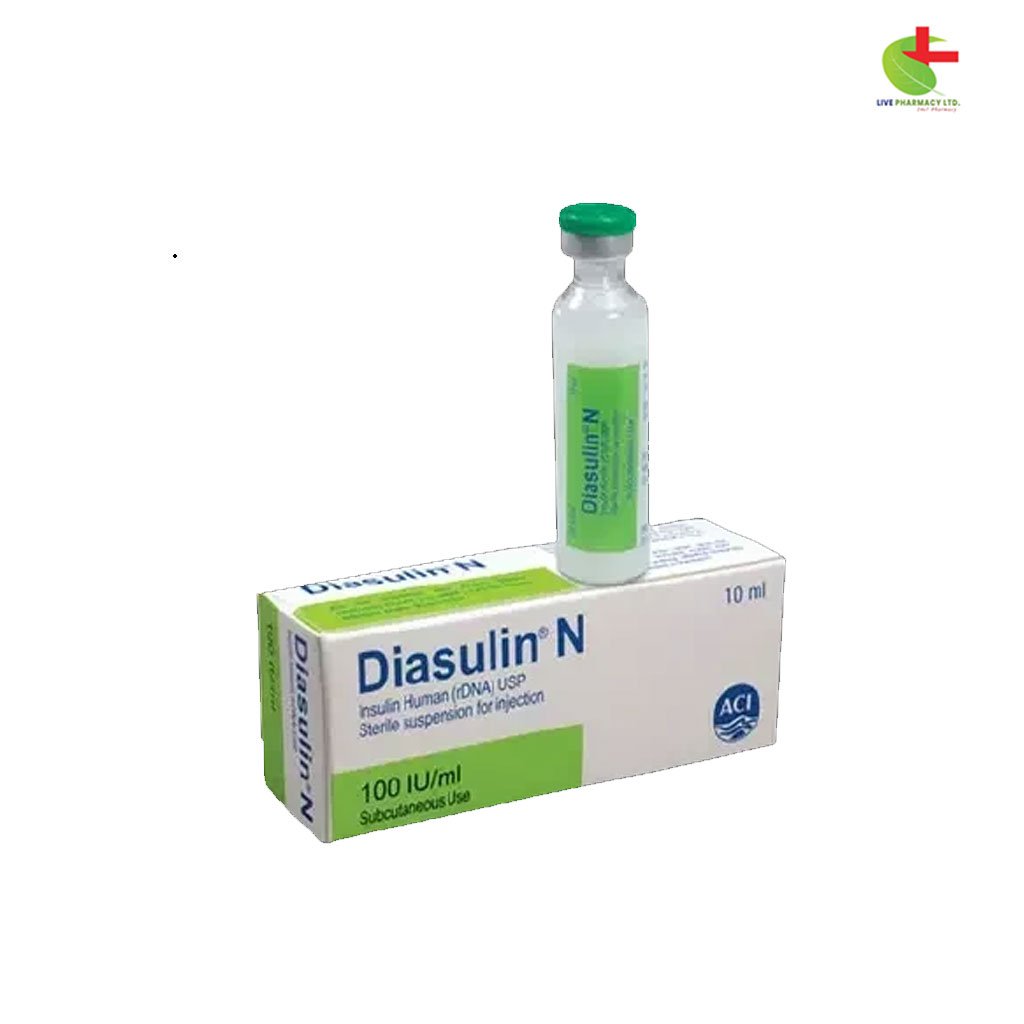Diasulin N 100IU
415.00৳ Vial(10ml)
- Diasulin N Injection is used for the treatment of type 1 and type 2 diabetes, gestational diabetes, and diabetic emergencies like ketoacidosis and hyperosmolar syndrome.
- It contains Insulin Human (rDNA), with formulations available in both regular and isophane insulin forms.
- It helps lower blood glucose levels by facilitating glucose uptake in muscles and fat cells.
- Common side effects include hypoglycemia, lipodystrophy, and hypersensitivity reactions. Always consult a healthcare provider for proper dosage and administration.
 Brand
Brand
|
ACI Limited |
|---|---|
 Generics
Generics
|
Insulin Human [rDNA] |
 Type
Type
|
SC Injection |
Indications
Diasulin N Injection is prescribed for:
- Type 1 Diabetes: To help regulate blood glucose levels in all patients with type 1 diabetes.
- Type 2 Diabetes: For patients whose blood sugar is not sufficiently controlled by diet and/or oral hypoglycemic agents.
- Diabetic Emergencies: To stabilize patients with diabetic ketoacidosis, hyperosmolar non-ketotic syndrome, or during stressful conditions such as severe infections or major surgeries in diabetic patients.
- Gestational Diabetes: Used to manage blood sugar levels in pregnant women diagnosed with diabetes.
Consult a registered healthcare provider before using this medication.
Composition
Diasulin N contains Insulin Human (rDNA) and comes in different formulations:
- Insulin Human R (40 IU/ml): Each milliliter contains 40 IU (1.388 mg) of soluble Insulin Human (Regular).
- Insulin Human R (100 IU/ml): Each milliliter contains 100 IU (3.47 mg) of soluble Insulin Human (Regular).
- Insulin Human N (40 IU/ml): Each milliliter contains 40 IU (1.388 mg) of Isophane Insulin Human.
- Insulin Human N (100 IU/ml): Each milliliter contains 100 IU (3.47 mg) of Isophane Insulin Human.
Pharmacology
Diasulin N is a sterile, clear, and colorless solution of Insulin Human. As a fast-acting insulin, it has a relatively short duration compared to other insulin types. It can be combined with long-acting insulins for comprehensive diabetes management.
Insulin works by promoting glucose uptake into muscle and fat cells while inhibiting glucose production in the liver. The pharmacokinetics of Diasulin N are as follows:
- Onset: Begins acting within 30 minutes.
- Peak Effect: Reaches maximum blood concentration in 1-3 hours.
- Duration: Effect lasts for about 4-6 hours.
Dosage and Administration
Dosage: The dosage is personalized based on the patient’s needs, as determined by a healthcare provider. For type 1 diabetes, the average daily requirement is between 0.5-1.0 IU/kg, while for children, it can range from 0.7-1.0 IU/kg. Type 2 diabetes patients usually require 0.3-0.6 IU/kg/day initially.
Post-Injection: After administration, patients should consume a meal or snack with carbohydrates within 30 minutes.
Consult a registered healthcare provider before using this medication.
Administration Instructions
- Subcutaneous Injection: Typically administered in the abdominal wall for faster absorption. The thigh, gluteal region, or deltoid area may also be used.
- Site Rotation: To prevent lipodystrophy, rotate injection sites within the same area.
- Other Methods: Intramuscular injection can be done under medical guidance, while intravenous injection should only be performed by a healthcare professional.
Dosage Adjustment: Changes in insulin needs may occur due to factors such as illness, physical activity, diet, or switching insulin types. Special attention is needed in cases of renal or hepatic impairment.
Drug Interactions
Certain medications may alter the effectiveness of insulin:
- Reduced Insulin Requirements: Oral hypoglycemics, MAO inhibitors, non-selective beta-blockers, ACE inhibitors, salicylates, and alcohol.
- Increased Insulin Requirements: Thiazides, glucocorticoids, thyroid hormones, beta-sympathomimetics, growth hormone, and danazol.
- Caution: Beta-blockers may mask hypoglycemia symptoms, and octreotide/lanreotide can cause fluctuating insulin needs. Alcohol may enhance and prolong insulin-induced hypoglycemia.
Contraindications
- Hypoglycemia: Diasulin N should not be used in patients experiencing hypoglycemia.
- Hypersensitivity: Avoid in patients who are allergic to human insulin or any component of the formulation.
Side Effects
Common side effects are typically dose-dependent and associated with insulin’s therapeutic action. The most frequent adverse effect is hypoglycemia, which can occur if the insulin dose exceeds the body’s requirement.
Other Side Effects:
- Lipodystrophy: Failure to rotate injection sites may lead to fat tissue changes.
- Hypersensitivity Reactions: Can include skin rashes, itching, difficulty breathing, and severe reactions like angioneurotic edema.
- Edema: Occasional swelling during insulin therapy, which typically resolves over time.
Pregnancy and Lactation
Insulin therapy is safe during pregnancy as it does not cross the placenta. However, blood glucose levels should be carefully monitored to prevent complications for both mother and baby. Insulin requirements usually decrease in the first trimester and increase during later stages of pregnancy. Postpartum, insulin needs generally return to pre-pregnancy levels.
For nursing mothers, insulin use does not pose any risk to the baby, although dose adjustments may be necessary.
Precautions and Warnings
- Hyperglycemia: Inadequate insulin dosing or therapy interruption, especially in type 1 diabetes, may lead to hyperglycemia and potentially fatal diabetic ketoacidosis.
- Hypoglycemia: If the insulin dose exceeds the body’s requirements, hypoglycemia may occur.
- Medication Transition: Switching insulin types or brands should always be supervised by a healthcare provider.
- Time Zone Changes: Patients traveling across time zones should consult their doctor, as changes in insulin and meal schedules may be required.
Overdose Effects
Overdose symptoms may include hypoglycemia. In mild cases, glucose or sugary foods can restore normal levels. In severe cases, glucagon (0.5-1 mg) or intravenous glucose should be administered by a healthcare professional. After regaining consciousness, oral carbohydrate consumption is advised to prevent relapse.
Therapeutic Class
- Medium-Acting Insulin
Storage Conditions
- Store Diasulin N between 2°C and 8°C (refrigerated).
- Do not use if frozen.
- Protect from light and excessive heat.
- Once in use, the vial may be kept at room temperature (below 25°C) for up to 6 weeks or up to 4 weeks at temperatures below 30°C.
- Do not use if the solution is not clear and colorless.













Reviews
There are no reviews yet.